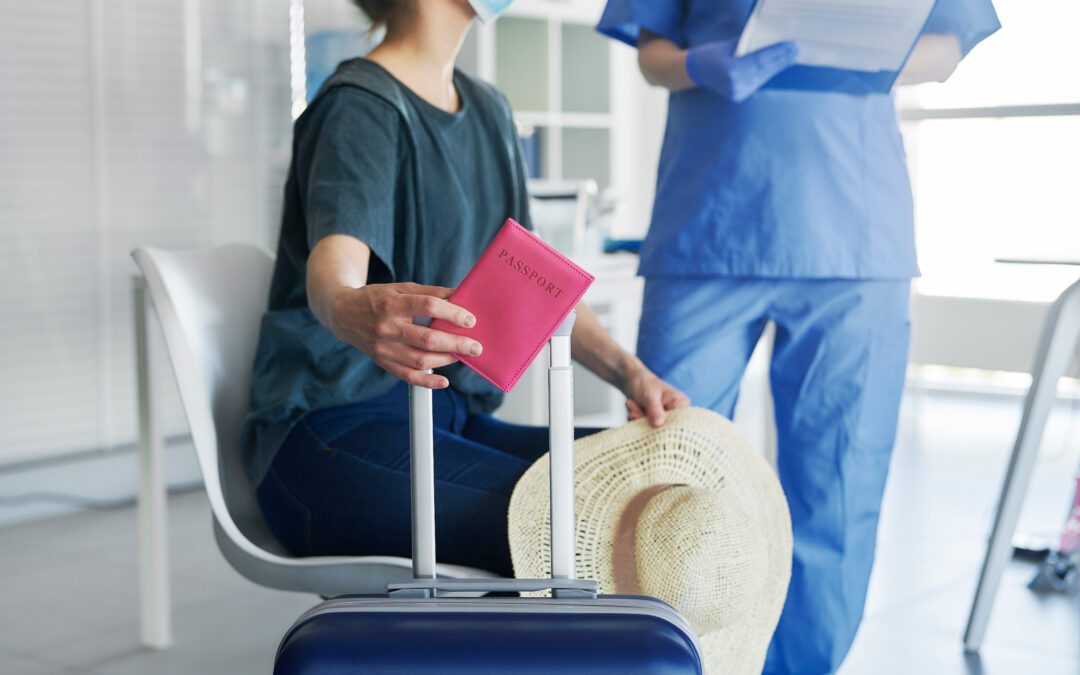Traveling with pre-existing medical conditions presents unique challenges, from managing medications to ensuring access to appropriate medical care.
For individuals with conditions such as heart disease, asthma, diabetes, or arthritis, preparation is key to a safe and enjoyable journey.
Without proper planning, travelers may face difficulties in accessing necessary treatments, managing symptoms, or dealing with medical emergencies away from home.
Travel is unpredictable, including changes in climate, diet, and daily routine, and can sometimes exacerbate health issues, making thorough preparation essential.
At Naples Concierge Health, we understand the importance of personalized healthcare for travelers, especially for those returning North from a winter in Florida.
Our concierge health services, including our specialized travel pack, ensure that patients have everything they need to maintain their well-being while on the move.
With a commitment to proactive healthcare, our services provide peace of mind, allowing travelers to focus on enjoying their trips without unnecessary health-related stress.
Understanding Your Health Needs Before Traveling
Assessing your health status and discussing travel plans with your healthcare provider is crucial before embarking on a trip.
A pre-travel consultation allows for a thorough evaluation of any potential risks associated with the travel itself or your specific destination. For instance, travelers with heart disease may need to consider extreme temperatures, while individuals with asthma should be aware of air quality concerns.
Consulting a doctor before traveling ensures that any necessary adjustments can be made to medications, lifestyle choices, and emergency plans.
A healthcare provider can offer guidance on how to manage health conditions while traveling, such as adjusting insulin dosages for diabetic travelers who may be crossing time zones.
This consultation also provides an opportunity to discuss potential vaccinations or preventative treatments as needed.
It is essential to develop a personalized travel health plan that outlines how to handle minor health concerns and medical emergencies. A well-structured plan reduces uncertainty and allows travelers to respond effectively if health issues arise.
For those planning extended stays, consider a second consultation before returning home to ensure health status remains the same.
Packing Essentials for Your Health
A well-prepared travel health kit can significantly improve the management of pre-existing medical conditions.
Medications are a top priority, and it is essential to pack a sufficient supply to last the entire trip, with extra doses in case of unexpected delays. It is advisable to store medications in their original packaging to avoid confusion at security checkpoints and to make identification easier.
Carrying a written prescription and a doctor’s note can be useful in case medication refills are required while away.
In addition to medications, travelers should bring necessary medical supplies that support their condition.
For instance, people with diabetes should pack glucose meters, test strips, and extra batteries, while individuals with respiratory conditions should ensure they have inhalers or nebulizers.
Mobility aids, such as canes or braces, should be checked for functionality before departure to prevent inconvenience during travel.
Having a travel-sized first-aid kit with essential items like bandages, antiseptic wipes, and pain relievers can be helpful for minor health concerns.
Proper documentation is another key aspect of travel preparedness. Travelers should keep a copy of their medical records, a list of current medications, emergency contact information, and proof of health insurance coverage. This can be especially important for Canadian travelers heading south for the winter as they may wish to purchase additional health insurance coverage.
Finding Accessible Accommodations
Selecting the right accommodations is essential for travelers with mobility concerns or other health needs. Not all hotels or rental properties are designed with accessibility in mind, so thorough research is crucial before booking a stay.
Travelers should inquire about the availability of wheelchair-accessible rooms, elevators, and other amenities that cater to specific medical conditions. Some hotels offer features such as grab bars in bathrooms, step-free access, and in-room refrigerators to store medications, all of which can make travel more comfortable.
Airlines and transportation providers should also be contacted in advance to arrange for necessary accommodations. Many airlines allow passengers to bring medical devices, such as oxygen tanks or CPAP machines, but they may require prior approval.
Travelers should communicate their needs early to ensure a seamless experience during transit.
Services such as airport assistance and priority boarding can benefit individuals with limited mobility or other medical concerns.
Online resources and travel agencies specializing in accessible travel can be valuable tools when planning a trip. Websites that provide detailed reviews of accessibility features in hotels, restaurants, and attractions help travelers make informed decisions.
Managing Health Conditions During Travel
Monitoring Health
Maintaining health while traveling requires careful monitoring of symptoms and treatment regimens.
Regular self-checks are particularly important for individuals with chronic conditions, as activity levels, diet, and climate changes can impact health. Tracking blood sugar levels, blood pressure, or respiratory function can help travelers detect early warning signs of complications.
Diet and Exercise
Diet and exercise play an important role in managing health conditions while traveling. It is essential to make balanced food choices that align with dietary restrictions.
Diabetic travelers, for instance, should opt for meals that maintain stable blood sugar levels, while individuals with heart disease should be mindful of sodium intake.
Staying physically active during travel, whether through walking breaks or light stretching, can promote circulation and overall well-being.
If traveling long distances by vehicle, take regular breaks to stand, stretch, and move around.
Managing Stress
Managing stress is another critical component of maintaining health during travel. Long flights, busy itineraries, and unfamiliar surroundings can contribute to stress and fatigue. Practicing relaxation techniques such as deep breathing, meditation, or listening to calming music can help travelers remain composed.
Prioritizing rest and maintaining a manageable schedule prevent overexertion, reducing the risk of health complications.
Seeking Medical Care While Away From Home
Knowing how to access healthcare while traveling is crucial for individuals with pre-existing medical conditions.
In the event of an emergency, having a plan in place can make all the difference. Travelers on short-term holiday should research healthcare facilities at their destination and identify hospitals or clinics that are well-equipped to handle their condition.
It is important to recognize when medical attention is necessary and not to ignore warning signs of health deterioration. Symptoms such as chest pain, severe shortness of breath, or sudden weakness should prompt immediate medical intervention.
Canadians headed to the United States should consider a travel health insurance policy covering medical expenses abroad to ensure they can receive necessary care without financial concerns.
For visitors in Florida for extended periods of time, Naples Concierge Health acts as a healthcare co-pilot, assisting them in coordinating medical care while they are away from home.
Canadians or Americans visiting from northern states can benefit from having reliable, compassionate healthcare support and advocacy while in Florida.
With us, travelers can develop a relationship with their physician, a physician they can see again when they return to Southwest Florida. But on top of that, Naples Concierge Health can assess health before departing for home, be a go to for coordinating care on the road when needed, and deliver a travel pack that ensures frequent travelers have everything they need, when they need.
Travel More Safely With Personalized Healthcare from Naples Concierge Health
Preparation and personalized healthcare are essential for travelers with pre-existing health conditions.
By taking proactive steps, such as consulting a doctor before departure, packing essential medications, researching accessible accommodations, and maintaining health-conscious habits, individuals can significantly reduce travel-related health risks.
With proper planning, travelers can enjoy their journeys without compromising their well-being.
For personalized healthcare solutions tailored to your unique needs, contact Naples Concierge Health today.
Our dedicated team is here to support you while in South West Florida and along your journey with expert guidance and comprehensive health services, allowing you to travel with confidence and peace of mind.

